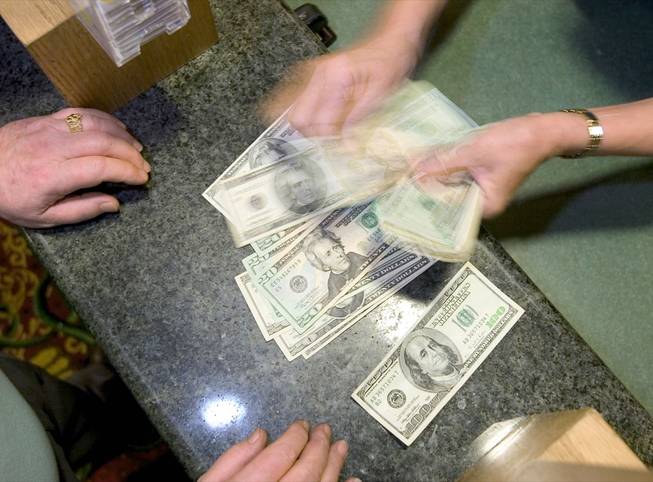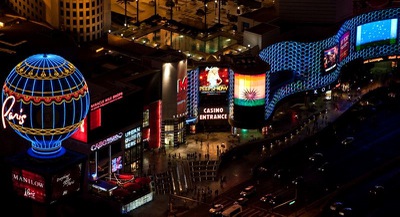
Las Vegas Sun Archives
Casino cage cashiers are among the employees the IRS hopes will heed its request to report suspicious transfers of large amounts of cash.
Thursday, Aug. 5, 2010 | 2:01 a.m.
Conflict of interest?
Although the rapid response approach makes sense for law enforcement, it seems in conflict with the atmosphere of privacy and adult freedom cultivated by Las Vegas casinos. Some industry observers say there’s a disincentive to report big spenders — especially now that times are tough. It’s a theory rejected by Paul Camacho, special agent in charge of criminal investigations for the IRS in Las Vegas.
Several months ago, the Internal Revenue Service agents who investigate financial crimes in Las Vegas began calling big casinos to set up meetings with their employees.
The calls were friendly.
In fact, the IRS — battling a bumper crop of white-collar crime — needed the casinos’ help.
The feds were asking floor workers to drop a dime and report suspicious people gambling with lots of money.
Since the 1980s, Nevada casinos have filed thousands of reports containing the names, Social Security numbers and other identifying characteristics of customers suspected of laundering money or simply gambling with ill-gotten funds. Those figures are rising in the recession and appear to coincide with increased financial crimes across the country.
“A lot of people come to Vegas to live large ... including a small group of people who engage in crime,” said Paul Camacho, IRS special agent in charge of criminal investigations in Las Vegas. “Mortgage fraud and Ponzi schemes have added a new dynamic. This isn’t just the drug dealer, pimp or organized crime figure. It’s the guy who stole the money from the church or from grandma.”
By all accounts, Nevada casinos are fulfilling their basic duties under federal anti-money laundering laws requiring them to report customers who bet, deposit or buy-in at the cage for $10,000 or more or engage in suspicious-looking gambling transactions of at least $5,000, such as exchanging cash for checks without gambling. The latter is probably the more valuable tool for law enforcement because it obliges casino employees to make expert, on-the-spot judgments of suspicious transactions.
After years of interacting with gamblers, casino workers are skilled readers of body language and financial funny business, the IRS says.
Still, the reporting process is fraught with pitfalls. Many casino employees — unaware that such reports are reviewed by the IRS to catch crooks — view reporting as pointless busywork.
“If you don’t think your job has any value, you’re not going to be passionate about it,” Camacho said.
The meetings with gaming workers were not a mere public relations effort by an agency that has suffered from a disagreeable image in Las Vegas, where casino workers once fought against taxing tip income and endured mass audits for underreporting tips.
Instead, the IRS had a practical and upbeat message for casino employees: If you see something suspicious, call us before a suspect gambles or disposes of illegal money.
Rather than waiting for Suspicious Activity Reports to roll in from casinos, which have 30 days to act, the IRS wants employees to phone right away.
Reports can be telling
Nevada casinos filed 3,204 reports in 2008 — a record — compared with 2,563 in 2007. Casinos filed 1,628 reports in the first six months of 2009. (Figures for the second half of the year aren’t yet available.)
Reports can red-flag a gambling stash that doesn’t mesh with a customer’s tax returns, or alert authorities to a pattern of suspicious transactions, such as large wire transfers, that could indicate a scam.
Without promptly hearing about them, such incidents might not be reviewed until months later by the IRS field office — which sits on a Suspicious Activity Report review committee that meets monthly to pore over the reports and includes agents from law enforcement agencies including the FBI, Drug Enforcement Administration and Nevada Gaming Control Board.
A tipoff from the front lines, the IRS says, would let agents watch gamblers spend money and interact with others in the casino — first-person evidence to build the government’s case against a corporate embezzler, drug smuggler or ordinary thief.
To speed the process, the IRS assigned agents to specific Strip casinos and distributed the agents’ phone numbers to casino workers.
The IRS is also asking casino employees to Google the names of customers making large or suspicious-looking transactions to determine whether they’re under investigation.
Tipoffs win results
Actual money laundering is uncommon in big Nevada casinos, but Camacho said wealthy scam artists often come to Las Vegas for the same reasons as fun-loving tourists: To enjoy a pampered escape in a town where big wads of cash don’t raise eyebrows.
Some notorious cases involved years of gambling before suspects were arrested — inviting questions about whether employees would have known of their customers’ illegal activity based on their gambling history or other behavior while in Las Vegas.
Federal prosecutors allege a Fry’s Electronics executive solicited kickbacks from vendors eager to sell their products at Fry’s stores, then wired $121.8 million into accounts controlled by MGM Grand and Las Vegas Sands over nearly four years to finance a high rolling lifestyle. The executive, Ausaf Umar Siddiqui, pleaded not guilty last year, and the case is ongoing.
San Francisco tax accountant Roberto Heckscher, prosecutors say, initiated one of the longest-running Ponzi schemes in American history, bilking working-class families and the elderly for tens of millions and financing regular trips to Las Vegas, Lake Tahoe and Atlantic City as early as the 1980s. He was recently sentenced to 20 years in prison after pleading guilty.
State and federal authorities won’t say whether transaction reports contributed to these arrests, although their gambling activity probably would have generated Currency Transaction Reports for deposits of more than $10,000 in a 24-hour period.
There’s evidence that more open lines of communication with the IRS, which is also sharing information on criminal suspects with the Gaming Control Board, is having an effect.
Quick action by Mandalay Bay, for example, helped the IRS indict a man last month on suspicion of gambling with money investors wired to the casino as part of a sports betting scheme. As a result, authorities hope to return some of the nearly $1 million they allege Yul Na, who is at large, scammed from investors.
What of Vegas’ rep?
Although the rapid response approach makes sense for law enforcement, it seems in conflict with the atmosphere of privacy and adult freedom cultivated by Las Vegas casinos.
Casinos typically seek bank information and a credit history on customers who obtain markers — interest-free gambling loans that are enforceable like checks, with demands for immediate repayment — to make sure the individual can repay the loan. But investigations usually end there.
Further, the casino workers who typically file transaction reports don’t have direct relationships with the gamblers in question, as they may only grant markers or dispense cash to players. Casino hosts, on the other hand, get to know players and cater to their needs. Hosts are marketing agents for casinos rather than finance employees involved in point-of-sale transactions subject to suspicious activity reporting. More important, they often are compensated based on how much their customers spend, putting them in potential conflict with policies that question the gamblers’ funding sources.
Some industry observers say there’s a disincentive to report big spenders — especially now that times are tough.
To imply that casinos harbor a “den of thieves” is disrespectful and incorrect, Camacho said.
Although casinos obviously want to protect players’ privacy, they are legally obligated to report large and suspicious transactions, he said.
Strip executive Bruce Aguilera says he takes this obligation seriously.
Actions worthy of a Suspicious Activity Report are so sporadic that the new arrangement “does not significantly impact casino operations,” said Aguilera, vice president and general counsel of Aria and Bellagio. “This is simply a matter of picking up the phone and making one call.”
Financial ramifications
The casinos’ attorneys, controllers, cage managers, surveillance employees and compliance officers were among those who attended a recent meeting with the IRS, which has also met with employees of all MGM Resorts International’s Southern Nevada properties.
Some industry observers say the IRS’ desire for immediate action raises financial concerns for casinos that are struggling in the recession.
“The last thing the casino wants is IRS agents showing up” and nosing around its property, Las Vegas gaming attorney and former Nevada regulator Greg Giordano said. “This isn’t great for repeat business and may have a chilling effect on gambling. Who isn’t scared of the IRS when it comes calling?”
Casinos, he said, have to weigh the risk of alienating customers against suspicions that they are gambling with illicit funds.
Like banks and other cash-rich businesses that file such reports, casinos don’t have a duty to investigate whether funds are legit. Nor are they in the business of catching criminals.
“There are conflicting interests here,” Giordano said.
But Camacho said his office, which mostly investigates crimes that don’t involve casinos, “doesn’t want visitors to feel the IRS is watching their every move. Because we are not.”
Casino workers still need the buy-in of executives to blow the whistle on customers — an intimidating prospect for an employee afraid for his job amid a recession, said David Schwartz, director of UNLV’s Center for Gaming Research.
“It’s definitely a laudable goal to detect financial crimes,” Schwartz said. “But it raises a lot of questions about what is suspicious. Bernie Madoff, as despicable as he is, would seem like he got his money legitimately, as he passed himself off as a successful investor.”
Might gamblers just leave?
And what of the employee who accuses a potentially innocent patron of suspicious behavior? The customer, Schwartz said, might take his gambling dollars elsewhere or retaliate against his accusers.
Many suspicious activities, regulators say, are clear-cut, such as exchanging a high volume of small bills for larger ones, presenting false IDs or buying in for amounts just under the $10,000 threshold.
“I don’t care who you are — a suitcase full of 20s is suspicious,” said Jerry Markling, chief of the Gaming Control Board’s enforcement division.
Some Nevada casinos will refuse offers to exchange cash for checks or larger bills when no gambling has occurred — the equivalent of an anonymous banking transaction. Before casinos became subject to federal cash reporting rules in 1985, Nevada and New Jersey — the only two states with casinos at the time — were hotbeds for money-laundering activity by criminals who exchanged mountains of cash for checks or big bills.
That changed when customers had to identify themselves to deposit or exchange large amounts of money, although criminals — especially in smaller casino states with less regulatory oversight — will still attempt to launder money, regulators said.
Aguilera said his properties share a common interest with the IRS to prevent and detect criminal activity.
“Keeping the lines of communication open and providing access to the agency is a win-win for both sides,” he said. “We are highly motivated to identify individuals who are engaged in fraudulent activity and who attempt to use our business as a channel to facilitate criminal acts.”
Casinos face penalties
Casinos that fail to report such transactions are subject to civil penalties of $25,000 per report or the amount involved in the transaction, whichever is greater. They also may be fined $25,000 per day for failing to establish or implement an adequate money-laundering prevention, including one that requires employees to track multiple transactions by one individual in a day.
Penalties for casinos that fail to report suspicious activity are few and far between, however.
The most recent was a $1 million fine in 2006 against tribal-owned Tonkawa Bingo and Casino in Oklahoma. The casino accepted $50 million in racing wagers from people with alleged ties to organized crime, including a transaction involving a duffle bag containing $300,000 in $100 bills that were deposited in multiple accounts to avoid reporting thresholds, federal authorities claimed.
No Nevada casinos have been fined in recent memory, although they frequently received small fines in the thousands of dollars for inadvertently failing to follow Nevada’s now-defunct “prohibited transactions” rule, which outlawed certain kinds of transactions of $3,000 or more. Since July 1, 2007, Nevada casinos have followed federal rather than state-authorized reporting rules. Once-frequent fines for procedural errors have disappeared — perhaps because the $10,000 threshold — long a part of the federal statute governing U.S. businesses of all types — is a higher standard that is easier to follow and enforce.
The Treasury Department has never fined Nevada casinos for failing to report suspicious-looking transactions, nor have the casinos been forced to forfeit money gambled by individuals who got the money by illegitimate means.
Bill Eadington of UNR’s Institute for the Study of Gambling and Commercial Gaming, thinks that casinos don’t officially report all suspicious actions because “they’d rather side with customers” when there’s uncertainty.
Although casino executives may be eager to root out potential criminals gambling on property, rank-and-file employees may be operating under the perception that they should only concern themselves with the bottom line, he said.
“There may be little upside to being a good public citizen.”
Employees want to do the right thing but may not be sure how, which is why the IRS is talking with lower-ranking employees about the importance of filing the reports and what kinds of activities it is red-flagging, said Steve Osborne, a supervisory IRS special agent who oversees the Suspicious Activity Report review team. “Casinos in this town really do want to be good corporate citizens and understand that allowing crime to occur, and turning a blind eye to it, is really to their detriment,” Osborne said.
Appealing to employees’ personal ethics can be a powerful motivator, according to Camacho.
“We get angry talking to victims and hearing how evil these (thieves) are,” he said. “You don’t want your casino to be the place where this criminal gambled away people’s life savings.”




Join the Discussion:
Check this out for a full explanation of our conversion to the LiveFyre commenting system and instructions on how to sign up for an account.
Full comments policy